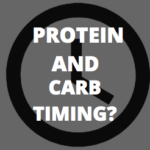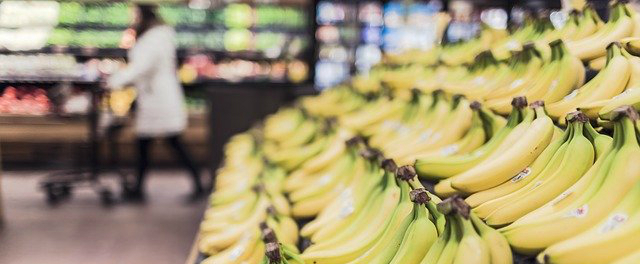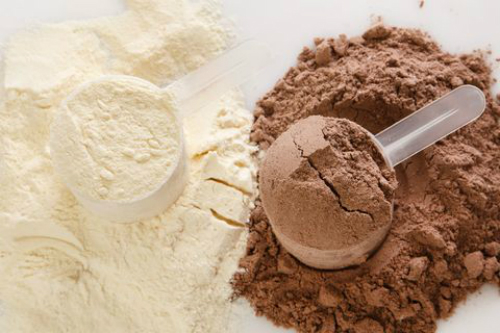 In this article, I’ll dive into some facts surrounding protein and carbs that you can adapt to your goals. Whether that’s fat loss, performance, or muscle building.
In this article, I’ll dive into some facts surrounding protein and carbs that you can adapt to your goals. Whether that’s fat loss, performance, or muscle building.
And if you’re not an avid gym-goer, or on a weight loss program, or a competitive athlete, don’t worry as you can still benefit from these tips.
Applying these carbohydrate and protein timing tips to your working day can improve cognition, energy levels, and mood.
Table of Contents
Editors Notes:
 Before I get started, there’s one important thing to mention: it’s almost impossible to give a simplified answer on exactly ‘when’ to eat protein and carbs – this will be goal and person-specific.
Before I get started, there’s one important thing to mention: it’s almost impossible to give a simplified answer on exactly ‘when’ to eat protein and carbs – this will be goal and person-specific.
Nutrition and our individual needs are so vast that it really isn’t possible to answer this question without considering everything on an individual basis. Such as when you exercise, when you wake up, and the structure of your working day etc.
However, don’t click off just yet!! I will explain how our bodies work when consuming proteins and carbohydrates.
That way, you’ll be able to know for YOURSELF how to adapt this information to your specific needs.
Our Body’s Energy System
For starters, let’s look at the way our bodies use energy.
 AEROBIC: First, we have an aerobic state which primarily uses fats as energy. This happens when you’re sitting, walking, or doing very light chores and activities.
AEROBIC: First, we have an aerobic state which primarily uses fats as energy. This happens when you’re sitting, walking, or doing very light chores and activities.
Then we have the anaerobic state. This is where your body taps into using stored carbohydrates from your muscles and liver as energy.
 ANAEROBIC: Anaerobic activity is sprinting heavy explosive weightlifting or any type of exercise that creates an oxygen dept – where you exercise beyond your body’s ability to convert fats for fuel.
ANAEROBIC: Anaerobic activity is sprinting heavy explosive weightlifting or any type of exercise that creates an oxygen dept – where you exercise beyond your body’s ability to convert fats for fuel.
Understanding this is the first step to successfully manipulating your macros for either fat loss, muscle building, endurance, or performance.
Then, depending on your goals, the time of day. Or if you’re exercising or not. You’ll begin to understand how to fuel your body efficiently.
When To Eat Carbohydrates

 Many people think that our bodies need large amounts of carbohydrates to function day-to-day. This isn’t the case. The mind prefers easy to access fructose when aerobic, while the muscles prefer glucose when in an anaerobic state.
Many people think that our bodies need large amounts of carbohydrates to function day-to-day. This isn’t the case. The mind prefers easy to access fructose when aerobic, while the muscles prefer glucose when in an anaerobic state.Carbohydrates are your preferred fuel source yes, that’s true. But unless you’re in an anaerobic state. Then, the body doesn’t really need all that many carbohydrates.
However, if you’re moving from a fat-burning state into a glucose fed state. Then you’ll want to eat several hours before a carbohydrate and protein-rich meal.
This combination of macros will help to increase muscle glycogen synthesis. And also muscle protein synthesis.
However, when you’re in a fat-burning state (which is the majority of the day for most people) then carbs can remain low.
And the good news is, there’s a trick to keeping energised through the day when low on carbs.
Feeding The Mind in an Aerobic State
 The mind still prefers carbohydrates to function, even when in a fat-burning state.
The mind still prefers carbohydrates to function, even when in a fat-burning state.
So, what can we do? We can feed our mind with fructose – the type that comes from strawberries and blueberries for example.
This is because fructose doesn’t spike insulin like other carb sources. Instead, it’s going straight to your liver where it then feeds your brain. (I)
So, if you’re going about your day-to-day activities with little efforts, such as in an aerobic state. Then fructose is the key to keeping the mind energised and happy.
Furthermore, eating certain (fructose) fruits that hold melatonin boosting properties, such as tart cherries, has been shown to improve mood and sleeping patterns.
Feeding The Muscles For Anaerobic Activity
 But what if you are doing exercise? when should you consume carbohydrates?
But what if you are doing exercise? when should you consume carbohydrates?
Ideally, you should look to load your muscle glycogen and liver stores several hours before exercise.
Now, there’s a lot to this, and it’s easy to get lost in the rabbit hole that is nutrition – however, I’ll do my best to simplify things.
The body can store roughly 2000 calories in carbohydrates in the muscles and liver. Beyond that, insulin works to store it as fat. And it takes roughly a day of fasting to use up muscle glycogen stores. (II)
Therefore, and the point I’m trying to make is, if you don’t overly restrict yourself, then you’ll find that you can exercise and feel good doing it several hours after eating a balanced meal.
When To Eat Protein

 While protein has been pushed as a post-workout macro. It can actually increase energy and fat loss when taken pre-workout due to the way it releases glucose and fatty acids into the bloodstream.
While protein has been pushed as a post-workout macro. It can actually increase energy and fat loss when taken pre-workout due to the way it releases glucose and fatty acids into the bloodstream.When eating a low carbohydrate higher protein diet (for fat loss or to maintain weight), a hormone called glucagon is released. (III)
And you could think of protein as a throttle pedal in your car. Signalling for the release of carbohydrates and fatty acids into your bloodstream.
Therefore, when you eat fewer carbohydrates and more protein, the release of glucagon speeds up.
However, if you cut back on carbohydrates too much and you only consume protein. Then, you’ll eventually burn out your reserves. As the release of glucagon will be in overdrive.
This is why eating fructose throughout the day is beneficial. Along with the correctly timed carbohydrate meals prior, or post-training.
Conclusion: Carbohydrate and Protein Timing
If you aren’t taking part in intense exercise, then carbohydrates can remain low – as the body will be using fats as energy.
This is where you can snack on fructose fruits throughout the day.
If you are doing exercise, you’ll need to determine when you are planning to exercise, and when your last carbohydrate meal was to make sure your muscle glycogen stores are topped up.
Remember, your body can hold roughly 2000 calories in carbs. And it takes roughly a day of fasting to deplete your glycogen stores.
As for protein, I like to eat several meals consisting of protein evenly throughout the day. And I always aim to eat protein at least two to three hours before training to improve my energy levels, strength, and recovery.
Final Word
As I’ve said once before, and I’m sure it won’t be the last time. It’s easy to get lost in the rabbit home that is nutrition – so there’s one more point I want to make.
Setting goals, and knowing how much your body needs for your sport (or daily calorie needs) will help you to tailor your timing needs.
As a general rule of thumb, and what I personally like to do is this;
 I eat three meals a day with a balance of proteins, carbs, fats, phytonutrients, minerals, and in some cases, polyphenol foods for enhanced performance and recovery.
I eat three meals a day with a balance of proteins, carbs, fats, phytonutrients, minerals, and in some cases, polyphenol foods for enhanced performance and recovery.
These meals will be a mixture of healthy proteins, fruits or whole grains, and some healthy fats such as avocados with vegetables.
By doing this, I know that my body isn’t deprived of any nutrients throughout the day. I just make sure to fit my meals around my aerobic, or anaerobic activity.
 One final word; once you know your body’s needs and the basics of nutrition as discussed here. Then, you can determine for yourself how much and WHEN you need to eat proteins and carbs.
One final word; once you know your body’s needs and the basics of nutrition as discussed here. Then, you can determine for yourself how much and WHEN you need to eat proteins and carbs.
And you’ll also known how long it will take you to refill or deplete your carbohydrate stores given the rules I’ve discussed in this article.
You might also like:
What To Eat Before a Workout: Performance and Recovery
What To Eat After a Workout and Why?
Carbohydrates, Glycogen, and Post-Workout Recovery
(I)“Fructose Is Generated in the Human Brain.” ScienceDaily, ScienceDaily, 23 Feb. 2017. (source)
(II)“Choose Your Carbs Wisely.” Mayo Clinic, Mayo Foundation for Medical Education and Research, 7 Feb. 2017. (source)
(III)Usami, M, et al. “Effects of High Protein Diet on Insulin and Glucagon Secretion in Normal Rats.” The Journal of Nutrition, U.S. National Library of Medicine, Apr. 1982. (source)

Leave a Reply